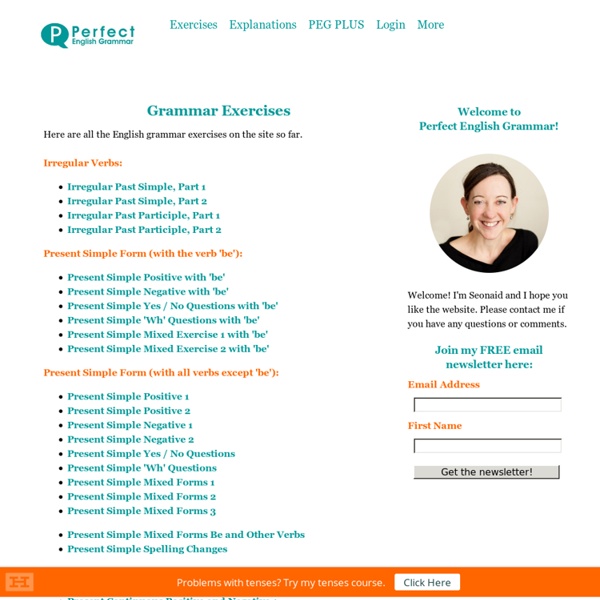Transition Words & Phrases
As a "part of speech" transition words are used to link words, phrases or sentences. They help the reader to progress from one idea (expressed by the author) to the next idea. Thus, they help to build up coherent relationships within the text. Transitional Words This structured list of commonly used English transition words — approximately 200, can be considered as quasi complete.
6 Ways to Make Teaching Grammar Fun (I'm Serious) - WeAreTeachers
I love grammar. But convincing my students to love grammar sometimes feels like trying to convince a bobcat to enjoy a nice, relaxing ice bath. It’s true that students are more likely to be engaged in the learning process if you’re excited about the content, but I’ve noticed that students will stay engaged if they’re participating in a way that leaves room for creativity, choice or snort-inducing laughter. Here are some ways to put a little grammar fun into your routine! 1) Build grammar practice into fun writing assignments. My most recent assignment for students to practice comma usage was to choose between writing a letter using one of the following points of view: an old curmudgeon complaining to city hall about a completely trivial issue, a teenager writing to their* celebrity crush, or an alien writing back to their alien friends after visiting Earth.
List of Interactive Quizzes
The quizzes with a magenta marble are also listed within the section or digital handout to which they apply. The twenty-one quizzes with a green marble and designated "Practice" have been adapted from the instructor's manual and other ancillary materials accompanying Sentence Sense: A Writer's Guide. They are duplicated here with permission of the author, Evelyn Farbman, and the publisher, Houghton Mifflin Inc. The seventeen quizzes with a gold marble
Can, Could and Be Able To Exercise
We ______________ go to the party. We're going to a wedding. will can't won't be able to couldn't want be able toHe __________ pass the exam if he studied harder. would be able to will be able to canI __________ remember his name. fish 'm not able to can'tThey ____________ go. The weather was too bad. couldn't weren't able to can'tSorry, Teacher. I ____________ do it yet. wasn't able to haven't been able to couldn'tShe _____________ come on holiday next month if her parents give her permission. 'll be able to can't couldThe fishing boat sank but luckily all the crew ____________ save themselves. were able to was able to couldA.
English Language Centre Study Zone: Welcome!
About the Study Zone The Study Zone is for students of the English Language Centre (ELC) at the University of Victoria. ELC teachers create the English language lessons and practice exercises. The site is designed for our adult English language learners, but all are welcome to read the lessons and use the exercises.
Linking Words — A complete List of English Connecting Words
Linking & Connecting Words It is essential to understand how Linking Words, as a part of speech, can be used to combine ideas in writing - and thus ensure that ideas within sentences and paragraphs are elegantly connected - for the benefit of the reader. This will help to improve your writing (e.g. essay, comment, summary (scientific) review, (research) paper, letter, abstract, report, thesis, etc.). It is also fundamental to be aware of the sometimes subtle meaning of these "small" words within the English language. "Linking Words" is used as a term to denote a class of English words which are employed to link or connect parts of speech or even whole sentences. They are also called connecting words.
phrasal verbs
Episode 08 – Write Back Soon – English Phrasal Verbs In episode 08, you’ll hear Lisa’s latest email to Duncan. Has he been a bit too pushy about Christmas? Is there too much pressure on Lisa to come home? Has she been trying to let him down gently by explaining that money is a bit tight? Or has Lisa had another offer to stay in Canada for Christmas?
Online Exercises
Affect vs. effect exercise Quiz-summary 0 of 10 questions completed Questions: Information
English Prepositions
So what are prepositions? A preposition is a word which is used before a noun to show its connection to another word in the sentence. For example: The dog rests on the armchair.
English Grammar Exercises Online, Interactive grammar exercises for ESL students
ESL Lesson Plans & Resources for Kids Kiz School provides: Video Tutorials, PPT, Interactive Games & Quizzes, Printable PDF Worksheets & Flashcards, among others. You don't need to be a professional teacher to use our materials.It is an effective, affordable private and public teaching solution for parents and schools. English For Kids Free ESL for resources for kids are one of our best offers.
Dave's ESL Cafe: Free English Grammar Lessons
Adjective Clauses #1 Adjective Clauses #2 Adjective Clauses #3 Adjective Clauses #4 Adjective Clauses #5 Adjective Clauses #6 Adjective Clauses #7 Adjective Clauses #8 Adjective Clauses #9 Adjective Clauses #10 Adjective Clauses #11 Adjective Clauses #12 Adjective Clauses #13 Conditional Sentences #1 Conditional Sentences #2 Conditional Sentences #3 Conditional Sentences #4 Conditional Sentences #5 Conditional Sentences #6 Conditional Sentences #7 Conditional Sentences #8 Conditional Sentences #9 Confusing Words: Bring and Take Confusing Words: Come and Go Confusing Words: Get #1 Confusing Words: Get #2 Confusing Words: Get #3 Confusing Words: Get #4 Confusing Words: Get #5 Confusing Words: Get #6 Confusing Words: Get #7 Confusing Words: Get #8 Confusing Words: Get #9 Confusing Words: Get #10 Confusing Words: Get #11 Confusing Words: Get #12 Confusing Words: Get #13 Confusing Words: Hang Confusing Words: It's and Its Confusing Words: Lend and Borrow
Common Mistakes
Common mistakes of ESL students April 16th, 2014 in Common Mistakes In this lesson we will take a look at some common mistakes ESL students make when they speak or write English.



